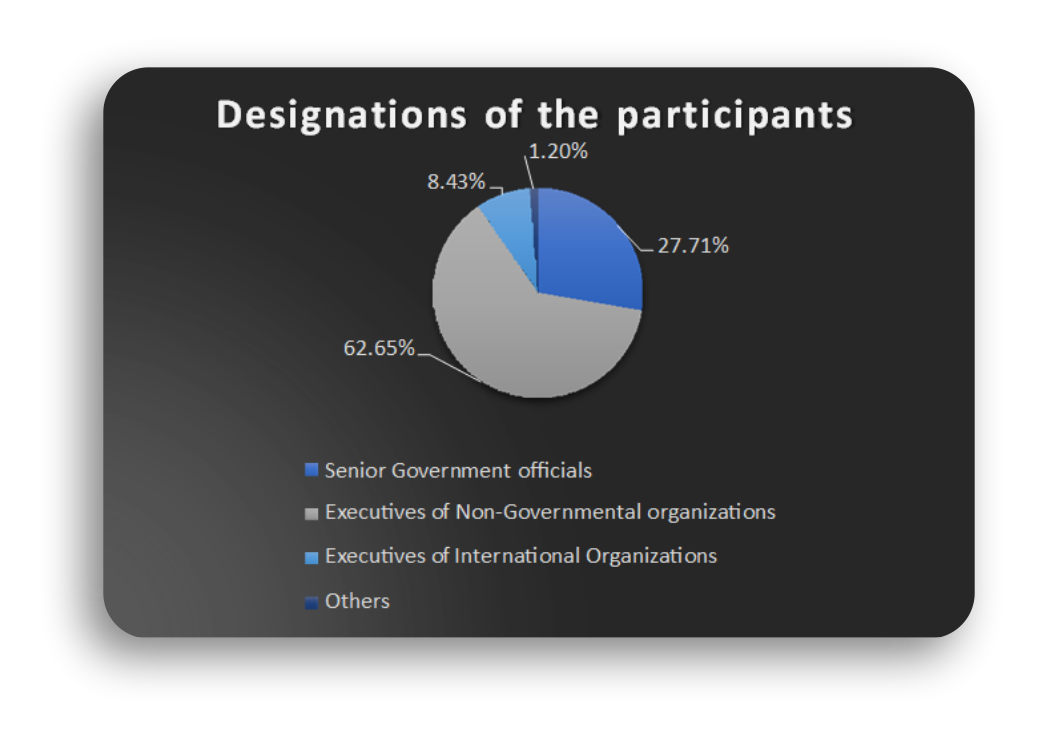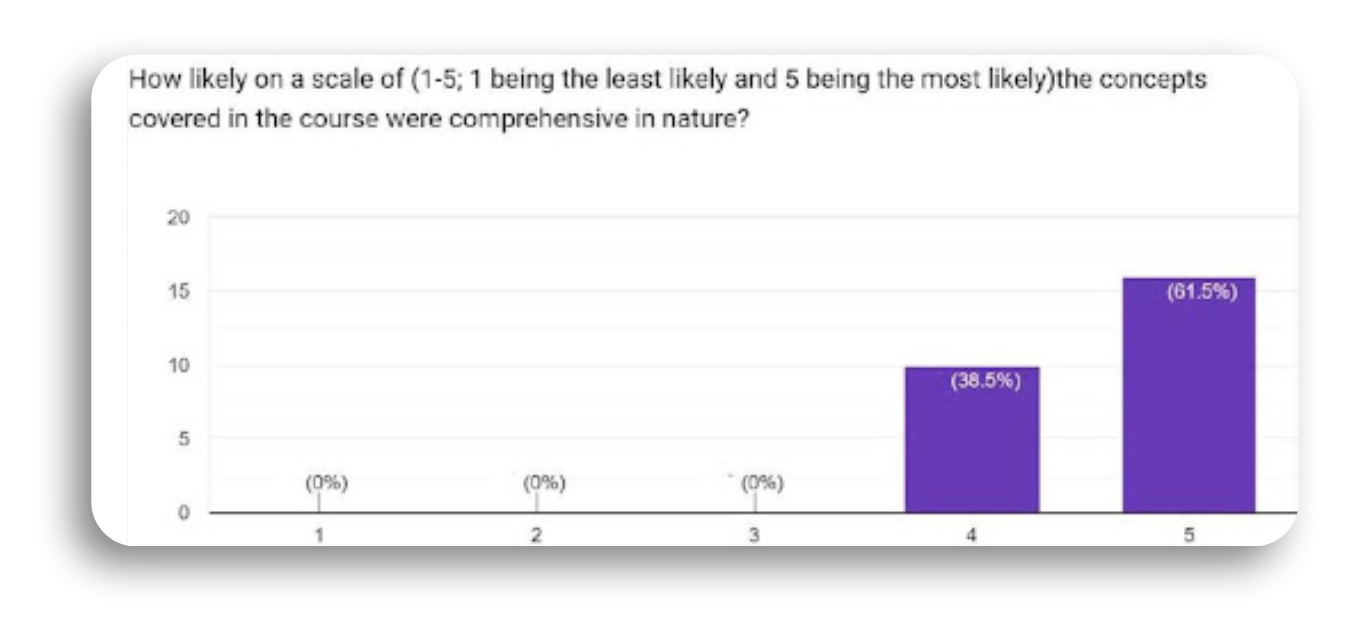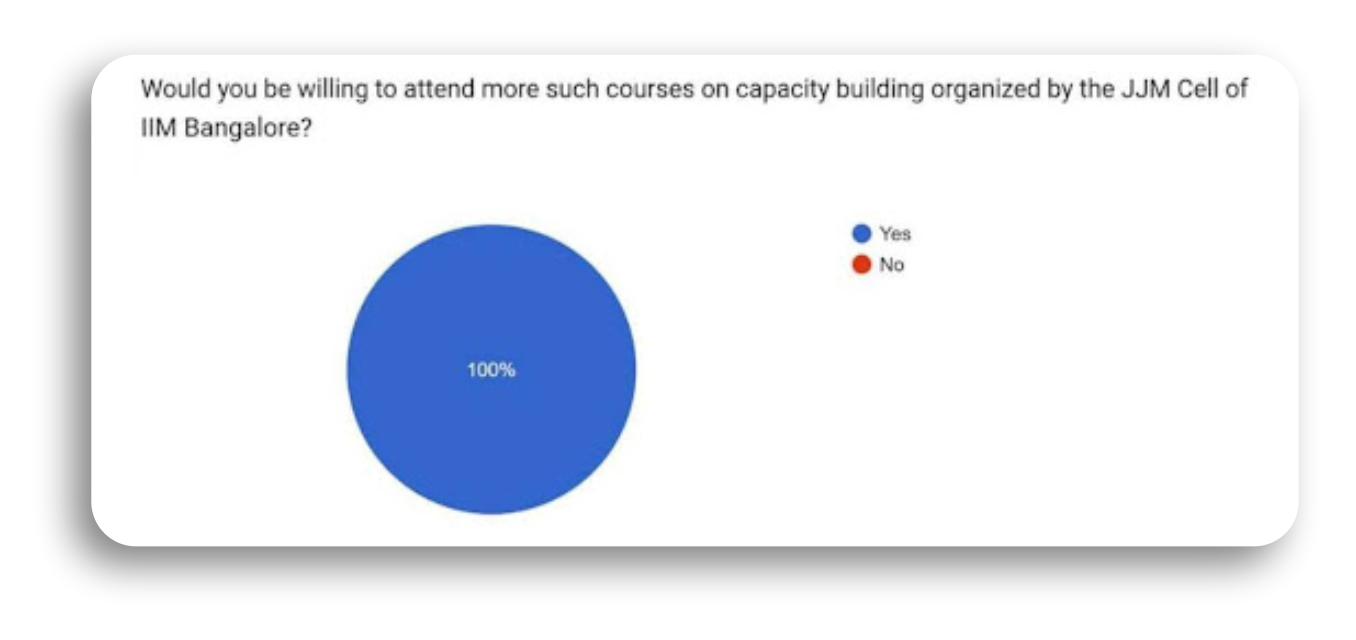Online training programme on Financial Management of Piped Drinking Water Service Delivery Organization held from 26th- 28th December 2023 as a part of Jal Jeevan Mission (JJM) Professor Chair outreach and capacity building activities at IIMB.
A three-day online training programme was conducted from 26th- 28th December 2023 on Financial Management of Piped Drinking Water Service Delivery Organization as a part of IIM Bangalore JJM professor chair outreach and capacity building activity. A total of 83 participants attended the online training programme. The course was held online (through ZOOM) consisting of three sessions of one hour each. Key objectives of the programme were to facilitate participants to understand the concepts and tools specifically developed for financial management of piped drinking water service and to apply them to real world situations.




Summary of the online training programme on Financial Management of Piped Drinking Water Service Delivery Organization held from 26th- 28th December 2023 as a part of Jal Jeevan Mission (JJM) Professor Chair outreach and capacity building activities at IIMB.
The training programme on Financial Management of Piped Drinking Water Service Delivery Organization covers various aspects such as the importance of financial management, the role of community ownership in cost recovery, conceptual underpinning in pricing, pricing strategy, costing methods, and illustration of case studies for multi village scheme, single village scheme and in-village distribution systems. It emphasizes the role of community participation in managing piped drinking water supply and the need for community ownership to ensure sustainability. It discusses the involvement of communities in infrastructure development, planning, implementation, and operations, as well as the determination of user charges for financial sustainability. This course provides an overview starting with the need for pricing piped drinking water, setting up user charges, discussing pricing methods - including cost-based, competition-based, and value-based pricing, followed by the determination of the demand and the supply. It also highlights how different market structures affect pricing. Water being a public good and an essential commodity, underlines the necessity to prioritize social welfare over profit. The course explores the different market structure and advocates for cost based pricing and competitive market pricing principles for determining user charges.
The second session discusses the role of pricing principles and tariff mechanisms for determining prices. It focuses on volumetric pricing and flat pricing strategies further delving into the three categories of volumetric pricing- uniform water tariff, two-part tariff and Increasing block tariff mechanisms. It illustrates the relationship between costs and demand and highlights the situations of low demand for piped drinking water system and recommends ways to correct the issue of low demand. It highlights the importance of full cost computation which is needed to be done even if the immediate objective is to cover only operational costs through user charges as it helps in understanding the total cost of service delivery and plan for meeting replacement expenses well ahead of time so that the burden of lumpsum expenses can be avoided. The course also discusses how perception plays a role in low demand of piped drinking water and how quality water availability is a pivotal factor in it. It briefly discusses the social costs and benefits of providing piped drinking water service.
The third session explores the different types of cost- Capital expenditure and Operational expenditure. It emphasizes the importance of understanding costs and computing capital costs and O&M cost for recovering them using user charges. It also focuses on time value of money and the pivotal role it plays in arriving at annualized fixed cost. It advocates for considering amortization rather than depreciation while calculating annualized fixed cost because depreciation alone cannot take care of full fixed cost as it only accounts for the book value of the capital cost. Further it demonstrates the steps involved in cost calculation of multi village scheme, single village scheme and in-village distribution system using the case studies from Gokarna and Odisha. Illustration of cost calculation for MVS and IVDS in Gokarna has been done by computing the Capital expenditure for both MVS and IVDS in Gokarna and calculating the individual O&M for MVS and SVS of Gokarna. Computation of capital and O&M cost for SVS has also been demonstrated. At the end of cost computation determination of surplus/deficit of piped drinking water system is being illustrated using an Excel template which contains the formulas for cost computation for MVS, IVDS and SVS. This template can be used for cost computation of different schemes. The template is useful in managing the finances and can be used by the members of the GP and VWSC to understand the minimum user charge for recovering the full cost of delivering piped drinking water to households.
Overall, the presentation aims to provide a comprehensive understanding of financial management, cost recovery, pricing principles, and practical illustrations in the context of piped drinking water service delivery organizations.
Efficient financial management at the VWSC level requires policy direction on the following:
|
Topics |
Links |
|
|
|
|
|
|
|
A three-day online training programme was conducted from 26th- 28th December 2023 on Financial Management of Piped Drinking Water Service Delivery Organization as a part of IIM Bangalore JJM professor chair outreach and capacity building activity. A total of 83 participants attended the online training programme. The course was held online (through ZOOM) consisting of three sessions of one hour each. Key objectives of the programme were to facilitate participants to understand the concepts and tools specifically developed for financial management of piped drinking water service and to apply them to real world situations.
Session 1 covers various aspects such as pricing, community ownership, and case studies. It emphasizes community participation in managing piped drinking water supply and advocates for cost-based pricing principles.
Session 2 discusses pricing principles and tariff mechanisms for determining prices. It highlights the importance of full cost computation and the social costs and benefits of providing piped drinking water service.
Session 3 The third session discusses the importance of understanding costs and computing capital and O&M costs. It advocates for considering amortization rather than depreciation while calculating annualized fixed cost. The session also demonstrates the steps involved in cost calculation of different schemes and provides an Excel template for cost computation.